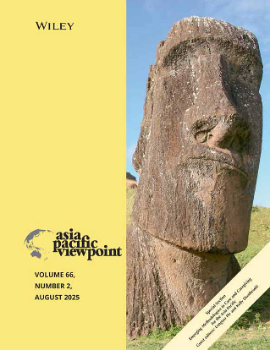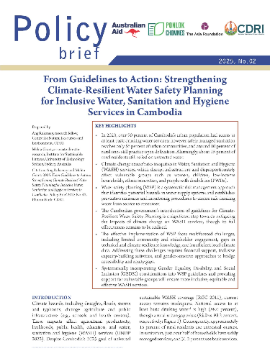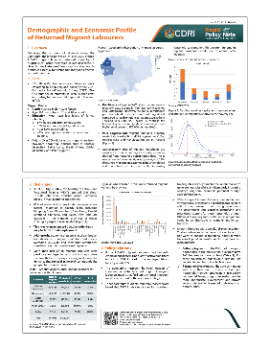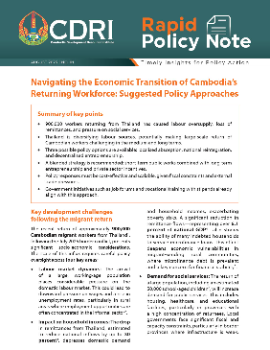
From Loss to Transformation? Towards Pluralistic and Politicised Agrarian-Climate Futures
Understanding how actors perceive and anticipate future states of the world is gaining traction in climate change governance scholarship and related calls for sustainability transformations. However, smallholder farmers, indigenous groups, and local communities, who are expected to bear disproportionate burdens of loss and damage from climate c...

From Guidelines to Action: Strengthening Climate-Resilient Water Safety Planning for Inclusive Water, Sanitation and Hygiene Services in Cambodia
In 2023, over 90 percent of Cambodia’s urban population had access to at least basic drinking water services; however safely managed sanitation reaches only 56 percent of urban communities, and around 10 percent of rural ones still practice open defecation. Alarmingly, about 15 percent of rural residents still relied on untreated water.Climate...

Demographic and Economic Profile of Returned Migrant Labourers
Following the outbreak of violence along the Cambodia–Thailand border on 24 July 2025, around 910,000 migrant labourers returned home by 11 August 2025, losing their main source of income. A clear picture of returnees’ demographic and economic profiles is essential for designing timely and effective support measures.To explore more insights, visit...

Navigating the Economic Transition of Cambodia’s Returning Workforce: Suggested Policy Approaches
900,000 workers returning from Thailand has caused labour oversupply, loss of remittances, and pressure on social services.Thailand is diversifying labour sources, potentially making large-scale return of Cambodian workers challenging in the medium and long terms.Three possible policy options are available: localised absorption, national reintegrat...

Parental Co-residence: A Catalyst for Women’s Employment Outcomes in Cambodia?
Co-residence with parents may decrease domestic or childcare responsibilities for women when their parents share household duties; however, the reverse may happen as parents age, leading to increased domestic responsibilities when older parents require more care. In our study, using the General Population Census of Cambodia 2019, we investigate how...

Bridging the Gap: An Examination of Teacher Deployment in Cambodian Preschools
The current study examines teacher deployment strategies in Cambodian preschools and identifies challenges related to the supply and deployment of teaching staff in early childhood education by assessing the adequacy, efficiency, and quality of teacher deployment. This study employs multiple approaches in data collection, including desk review of e...

Disentangling Community-Based Resource Governance Through Knowledge Systems Mapping: Insights from Community Fish Refuges In Rural Cambodia
Inland fisheries in Cambodia are of great importance to the livelihoods of rural communities, as they provide sustenance and seasonal income for the local population. Community fish refuges (CFRs) are natural or human-made water bodies that hold water throughout the year, providing a dry-season sanctuary for aquatic life. Managed mainly by the loca...

Cambodia’s New Growth Strategy: Priorities for High-Quality and Sustainable Development
The 16th Cambodia Annual Outlook Conference 2025 (COC25) convened leaders from government, business, civil society, and academia to debate Cambodia’s strategic growth path amid global uncertainties. Anchored in CDRI’s flagship report, Cambodia’s New Growth Strategy, the conference underscored the need for a policy shift—moving beyond high growt...

A New Growth Strategy for Cambodia: Economic Scenarios
Cambodia was one of the fastest growing economies in the world prior to the pandemic. Given this strong performance, The Royal Government of Cambodia’s Vision 2050 aims for the country to reach high-income country status by mid-century. The COVID-19 pandemic, Russia’s invasion of Ukraine, and a troubled domestic real estate sector have made it chal...

Cambodia Economic Diversification Pathways
Cambodia’s rapid economic growth over the past two decades has been driven primarily by structural transformation, as labour shifted from agriculture to higher-productivity jobs in manufacturing and services. However, the country’s growth model—dominated by garment manufacturing, tourism, and construction—is now facing limitations, necessitating a...
